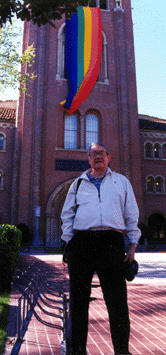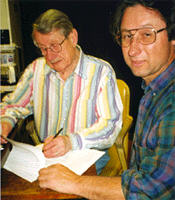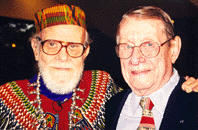 |


Helped Establish Basic Erotic Freedoms in the USA Openly Led America's First Famous Gay Organization |
"One by one, the old guard goes. With the passing of Hal Call, we are down to a precious few. As American gays move ahead with successes unthinkable just a very few years ago, we should not forget those who started the modern gay movement a half-century ago, and kept it going through its formative years. From the outset in 1951, Hal Call was one of those pioneers. As President of the national Mattachine Society in the 1950's and active in the effort to push the cultural envelope in later years, he made his mark and helped to lay the indispensable foundation, providing the impetus for the astonishing cultural changes which we are witnessing and enjoying today." In August, 1952 an event that spurred Call to later activism was his uncalled-for arrest by homophobic police in a Chicago park. "Eight hundred dollars bought off the arresting officers and the judge," he recalled. Historian, James T. Sears of Harvard University, alerted GayToday to Call's passing, saying "he deserves a good send off." Lately, Dr. Sears noted, Call had felt "under the weather", and had appeared to be short on energy in November during the historian's final visit with the pioneer. Sears, the nation's foremost authority on Southern lesbian and gay history, is presently completing an authorized biography of Hal Call titled Calling Shots: The Life of Hall Call, Male Erotica and the Gay Movement to be published in 2002. The historian says:
Hal Call himself waxed critical of what he felt appeared to be an antipathy to sex shown by the later gay rights movement. He said: "With the exception of the few years following the Stonewall Rebellion when the bells of sexual freedom rang, the American gay movement reflects our culture's discomfort with sex. Though sexual energy pulsated from bath houses to discos, two generations of movement leaders have battled for sexual freedom without having any sex…We've always been under the yoke of the Judeo-Christian anti-sexual ethic." Part of Call's legacy, believes Dr. Sears, is that of "a fierce defender of free speech." He says that Call "naturally found himself at odds with federal authorities and many homosexual leaders as he reminded them that fighting for homosexual rights meant defending sexual liberty."
Born in 1917 and reared in depression-era Missouri, Call went into the Army in 1941, becoming an officer just as the United States was entering the Second World War. In an interview in Making History, he told author Eric Marcus: "I had absolutely no sexual activity in the armed forces with anyone, because I knew it was a no-no. Besides, when you became a commander and an officer, you didn't carry on with the troops. There were some who were carrying on, and we'd hear of it now and then, but we'd never try to investigate it. You have to consider the circumstances. "You were in the South Pacific, down on Espiritu Santo. You came from a combat operation in the Ryukyus. The men had not been home or had a furlough or leave or anything like that for two or three years. Years, not months. "They were under the stress of war, and they were going into combat again where a lot of them were not going to come out. So if they went up under the trees And sucked a little cock and jacked off together or something like that, So what? Who was harmed? Nobody. That's the way the armed forces should look at it. The armed forces could not operate without homosexuals. Never could. Never has. And never will." In 1964 Hal Call appeared in LIFE magazine's first article examining homosexuality in America. He was also an interviewee in the first national CBS TV-documentary, The Homosexual, hosted by Mike Wallace and aired on March 7, 1967, thus making him one of the first openly gay faces seen by millions nationwide.
In the midst of the volatile McCarthy era, Call "led a palace coup," writes Sears, "that replaced the Fifth Order with openly elected officers under a constitution in 1953." Harry Hay, however, later reached out to his old movement opponent and in a personal note to him dated 1986, said: "Hal Call—my daring fiercest adversary---my dear, we are the survivors of a long and marvelous travail. Take a deep breath, we've only just begun our shared struggles." Cal was among the first gay men in America to publicly identify himself as such. Also, he assisted another openly-gay man, Jose Sarria, the first in the U.S. to run for public office, providing him with financial and printing services. Dr. Sears' Calling Shots will tell of Call's earliest sexual experiences in Grundy County, Missouri and will focus too on his filming of video sex stars like Tony Rivers and Peter Decker. San Francisco's changing face, including the arrival of the Harvey Milk era, are scheduled to seen in this book through the salty pioneer's observant eyes. Among Call's early accomplishments was the editing and publication of America's second gay movement magazine, Mattachine Review. Dr. Sears, explaining that the Review advanced homosexual rights, said that it also argued "against the formation of a minority homosexual culture advocated by the editors of the rival ONE magazine." Media pioneer, Randolfe Wicker, the first to appear as openly gay on radio and TV, wrote for the Review. He'd met Call in 1959. "As between ONE, which seemed full of fiction, poetry, and the like, the Mattachine Review appealed to me as the more 'intellectual' of the two publications," Wicker told GayToday. "The article I wrote was titled 'Effeminacy vs. Affectation', and I argued on behalf of a natural effeminacy in men while critiquing parodies of women." "Hal Call was a true pioneer," Wicker recalls, "His hand, at an early point in time, rested on one of the two principal power levers of the gay movement." |




